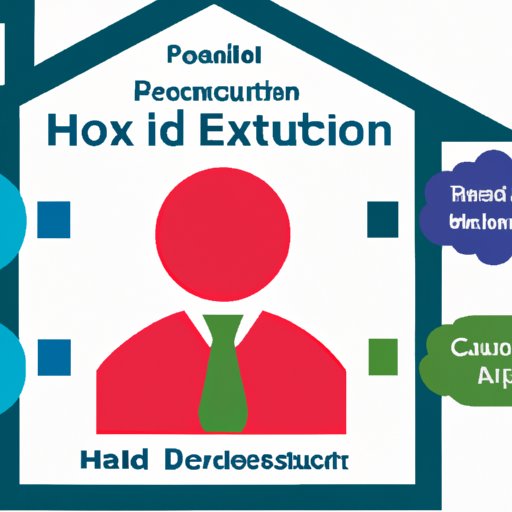Introduction
The IRS defines the head of household filing status as a taxpayer who is unmarried or considered unmarried on the last day of the year and pays more than half the cost of keeping up a home for themselves and a qualifying person. This article will explore the criteria to be considered a qualified dependent for head of household, as well as the potential tax benefits of claiming such a dependent.

Exploring the Requirements to be Considered a Qualified Dependent for Head of Household
In order to be considered a qualified dependent for head of household, the individual must meet certain criteria related to their age, relationship to the taxpayer, and financial support.
Age Requirements
For an individual to be considered a qualified dependent for head of household, they must be under the age of 19 at the end of the tax year, or be a full-time student under the age of 24 at the end of the tax year. In addition, individuals who are permanently and totally disabled at any time during the tax year are also eligible to be considered a qualified dependent.
Relationship Requirements
The individual must be related to the taxpayer in one of the following ways: child, stepchild, foster child, sibling, stepsibling, or a descendant of any of these individuals. The individual can also be a parent, stepparent, or other qualifying relative, provided they lived with the taxpayer for the entire year and received more than half of their financial support from the taxpayer.
Financial Support Requirements
In addition to meeting the age and relationship requirements, the individual must have received more than half of their financial support from the taxpayer for the tax year. Financial support includes items such as food, shelter, clothing, education, medical and dental care, recreation, and transportation. In some cases, the individual may not live with the taxpayer, but if the taxpayer provides more than half of the individual’s financial support, they may still qualify as a qualified dependent.

Assessing the Financial Impact of Claiming a Qualified Dependent for Head of Household
Claiming a qualified dependent for head of household can provide a number of tax benefits for the taxpayer.
Tax Deduction Benefits
Claiming a qualified dependent can result in a number of tax deductions for the taxpayer. These deductions include the standard deduction, personal exemptions, and the earned income credit. In addition, taxpayers may also be able to claim additional deductions depending on their situation.
Benefits for Claiming Dependents on Other Taxes
Claiming a qualified dependent can also provide benefits when filing other taxes, such as state income tax. In some states, taxpayers may be eligible for additional deductions or credits for claiming a qualified dependent, which can reduce their overall tax liability.
Potential Penalties for Falsely Claiming a Qualified Dependent
It is important to note that falsely claiming a qualified dependent can result in serious penalties from the IRS. These penalties may include fines, interest charges, and even possible jail time. Therefore, it is important to make sure the individual meets all of the criteria to be considered a qualified dependent before claiming them on a tax return.
Analyzing the Eligibility Rules for Claiming a Qualified Dependent for Head of Household
In addition to meeting the age, relationship, and financial support requirements, there are also certain eligibility rules that must be met in order to be considered a qualified dependent for head of household.
Income Limits
The individual must not have earned more than the annual income limit set by the IRS in order to be considered a qualified dependent. For the 2020 tax year, this limit is $4,300. If the individual earns more than this amount, they cannot be claimed as a qualified dependent.
Dependency Tests
The individual must also pass certain dependency tests in order to be considered a qualified dependent. These tests include the gross income test, joint return test, citizenship test, and member of household or relationship test.
Special Rules for Non-Custodial Parents
In some cases, a non-custodial parent may be able to claim a qualified dependent. To do so, they must meet certain criteria, including having a court order allowing them to claim the dependent, paying more than half of the dependent’s support, and providing written declaration that they will not claim the dependent on their tax return.
Conclusion
Claiming a qualified dependent for head of household can provide a number of tax benefits for the taxpayer. In order to be considered a qualified dependent, the individual must meet certain criteria regarding their age, relationship to the taxpayer, and financial support. There are also certain eligibility rules that must be met, such as income limits and dependency tests. It is important to understand the requirements and potential tax benefits of claiming a qualified dependent before filing a tax return.
For more information on claiming a qualified dependent for head of household, visit the IRS website or consult a tax professional.


